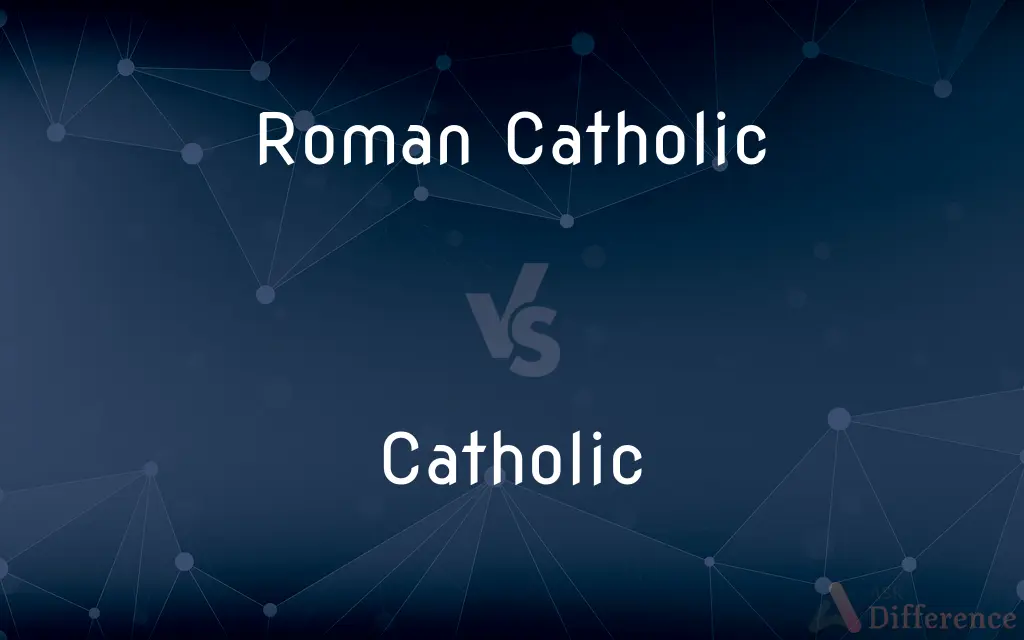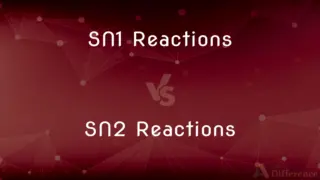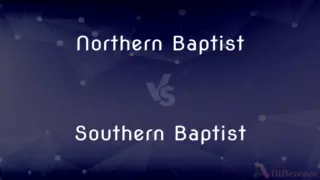Roman Catholic vs. Catholic — What's the Difference?
By Tayyaba Rehman — Published on January 6, 2024
Roman Catholic refers to the Christian church under the Pope's authority in Rome, while Catholic, in a broad sense, means "universal" or can denote Christians of various traditions.

Difference Between Roman Catholic and Catholic
Table of Contents
ADVERTISEMENT
Key Differences
The terms Roman Catholic and Catholic are often used interchangeably, but they have distinct meanings. Roman Catholic specifically pertains to the Christian denomination that recognizes the authority of the Pope based in Rome. This church is known for its distinct liturgy, traditions, and theological stances, all under the oversight of the Vatican.
In contrast, the term Catholic, when capitalized, can refer broadly to all Christians who follow the Nicene Creed, which includes Eastern Orthodox and some Protestant denominations, emphasizing the universality of the Christian faith. However, in most contexts, especially in Western countries, when people mention Catholic, they usually are referring to the Roman Catholic Church.
While Roman Catholic pinpoints the largest single Christian denomination, Catholic carries a broader connotation. Historically, the term "catholic" (derived from the Greek word 'katholikos') means "universal." So, in ancient Christian writings, when authors referred to the "catholic church," they were speaking of the universal body of believers in Christ, not specifically the church aligned with Rome.
It's essential to recognize that, contextually, the term Catholic might mean different things. In a theological or historical discussion, it might mean all Christians of the Nicene tradition. However, in everyday language, especially in the West, it's usually synonymous with Roman Catholic.
Comparison Chart
Definition
Christian church under the Pope's authority in Rome
Broadly, "universal" or can denote Christians of various traditions
ADVERTISEMENT
Authority
Recognizes the Pope in Rome
Can be various patriarchs, not necessarily the Pope
Usage in Context
Refers specifically to the church aligned with Rome
Can mean all Christians or, commonly, those of the Roman tradition
Historical/Original Meaning
A distinction made post-Reformation
"Universal", pertaining to the whole Christian body
Denominational Inclusion
Exclusively those under the Pope
Can include various Christian traditions
Compare with Definitions
Roman Catholic
A member of the church with traditions stemming from Rome.
Her Roman Catholic background influenced her perspective on various issues.
Catholic
Universal or general in terms.
His taste in music was truly Catholic, encompassing various genres.
Roman Catholic
Christian denomination recognizing the Pope's authority.
She regularly attends a Roman Catholic parish in her town.
Catholic
Christian traditions that recognize the Nicene Creed.
The Eastern Orthodox Church is Catholic but not Roman Catholic.
Roman Catholic
The church with its administration centered in Vatican City.
He was guided by Roman Catholic teachings in his daily life.
Catholic
Broad term for Christians, especially in the West, often referring to Roman Catholics.
Most Catholic churches in the region follow the Latin rite.
Roman Catholic
Christians following the Latin rite.
Roman Catholic liturgy has specific rituals distinct from other Christian practices.
Catholic
Relating to the historic, undivided Christian church.
The ancient creeds were formulated to define Catholic belief against heresies.
Roman Catholic
Subset of the broader Catholic Christian tradition.
As a Roman Catholic, she venerated saints and followed the church's calendar.
Catholic
Of broad or liberal scope; comprehensive
"The 100-odd pages of formulas and constants are surely the most catholic to be found" (Scientific American).
Catholic
Including or concerning all humankind; universal
"what was of catholic rather than national interest" (J.A. Froude).
Catholic
Of or involving the Roman Catholic Church.
Catholic
Of or relating to the universal Christian church.
Catholic
Of or relating to the ancient undivided Christian church.
Catholic
Of or relating to those churches that have claimed to be representatives of the ancient undivided church.
Catholic
A member of a Catholic church, especially a Roman Catholic.
Catholic
Universal; all-encompassing.
Catholic
Alternative case form of Catholic.
Catholic
(obsolete) Common or prevalent; especially universally prevalent.
Catholic
Embracing all.
Catholic
Universally applicable.
Catholic
Of universal human interest or use.
Catholic
(slang) Permissive of unprotected sex.
Catholic
Universal or general; as, the catholic faith.
Men of other countries [came] to bear their part in so great and catholic a war.
Catholic
Not narrow-minded, partial, or bigoted; liberal; as, catholic tastes.
Catholic
Of or pertaining to, or affecting the Roman Catholics; as, the Catholic emancipation act.
Catholic
A person who accepts the creeds which are received in common by all parts of the orthodox Christian church.
Catholic
An adherent of the Roman Catholic church; a Roman Catholic.
Catholic
A member of a Catholic church
Catholic
Of or relating to or supporting Catholicism;
The Catholic Church
Catholic
Free from provincial prejudices or attachments;
Catholic in one's tastes
Catholic
Pertaining to the universal Christian church.
The creed speaks of the holy Catholic church.
Common Curiosities
Does Roman Catholic mean the same as Catholic?
Not always. While often used interchangeably, Roman Catholic is specific to the Pope's followers, while Catholic can be broader.
Can Protestant denominations be considered Catholic?
Some Protestant groups might claim to be Catholic in the sense of adhering to the "universal" Christian faith, but they're not Roman Catholic.
Why is the term Catholic used for the church under the Pope?
In many contexts, especially Western ones, Catholic has become synonymous with Roman Catholic.
Can an Eastern Orthodox believer be called Catholic?
Yes, in the sense that they belong to the universal (Catholic) Christian tradition but not Roman Catholic.
What is the significance of the Pope to Roman Catholics?
The Pope is the spiritual leader and highest authority for Roman Catholics.
Does the term Catholic mean "universal"?
Yes, derived from the Greek 'katholikos', Catholic historically means "universal."
Are all Catholics Roman Catholic?
No, while all Roman Catholics are Catholic, not all Catholics are Roman Catholic.
Is the Nicene Creed a Catholic belief?
Yes, it's a belief of the Catholic (universal) church, accepted by both Roman Catholics and other Christian traditions.
Are there Catholic churches not under the Pope's authority?
Yes, some Catholic traditions, like the Eastern Orthodox, don't recognize the Pope's authority.
Why is there a distinction between Roman Catholic and Catholic?
The distinction arose from historical and theological developments, especially post-Reformation.
Can the term Catholic be used in non-religious contexts?
Yes, Catholic can mean universal or general, unrelated to religious connotations.
Which church uses the Latin rite?
The Roman Catholic Church primarily uses the Latin rite.
How do Roman Catholic beliefs differ from other Catholic traditions?
Roman Catholic beliefs may differ in areas like papal authority, liturgy, and certain theological points from other Catholic traditions.
Why might someone identify as Catholic and not Roman Catholic?
They might belong to another Catholic tradition, like Eastern Orthodox, or emphasize the universality of their Christian faith over specific Roman Catholic distinctions.
Are Roman Catholic practices universal?
While Roman Catholic beliefs are consistent, practices might vary culturally across regions.
Share Your Discovery

Previous Comparison
SN1 Reactions vs. SN2 Reactions
Next Comparison
Northern Baptist vs. Southern BaptistAuthor Spotlight
Written by
Tayyaba RehmanTayyaba Rehman is a distinguished writer, currently serving as a primary contributor to askdifference.com. As a researcher in semantics and etymology, Tayyaba's passion for the complexity of languages and their distinctions has found a perfect home on the platform. Tayyaba delves into the intricacies of language, distinguishing between commonly confused words and phrases, thereby providing clarity for readers worldwide.













































